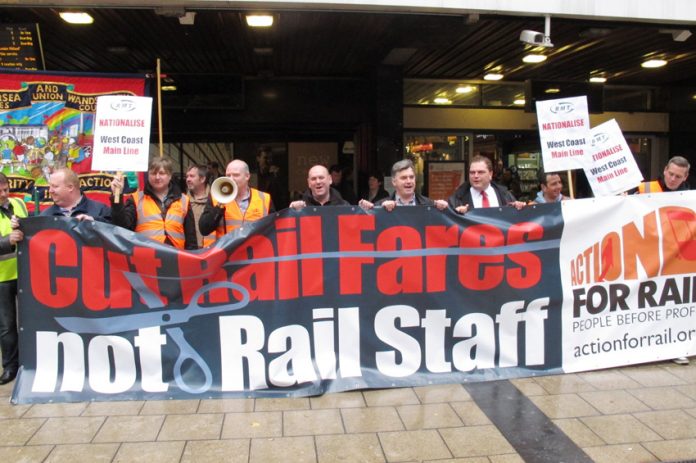RAIL fares have risen three times faster than wages since the slump began in 2008, according to a new analysis published yesterday by the TUC’s Action for Rail campaign.
Between 2008 and 2012 average rail fares increased by 26.6 per cent, while average wages rose by just 9.6 per cent over the same period – well below the rate of inflation.
And train fares are set to outpace wages and inflation again in 2013, with the Association of Train Operating Companies announcing a 3.9 per cent average increase last week, with some fares set to rise by 10 per cent from January.
The TUC pointed out that a family of four (two adults and two children) looking to travel to London on an anytime ticket from Swansea, Plymouth, Leeds, Manchester or Newcastle in 2013 will have to pay more than £481!
Rail unions, transport campaigners and passenger groups protested against the massive fare hikes outside London railway stations yesterday.
They handed out Christmas cards warning train travellers that as well as fare rises in the New Year, they can look forward to a 2013 packed full of cancelled trains, staff cuts and ticket office closures – all at a time when the train companies are making huge profits.
TUC General Secretary Designate and chair of Action for Rail, Frances O’Grady, said: ‘Train fares have massively outstripped wages and inflation, even during the recession.
‘Train operating companies seem to have completely ignored the fact that real-term incomes and living standards have fallen and have ploughed ahead with eye-watering price-hikes.
‘Average fare increases have risen at nearly three times the rate of average wages since 2008.’
ASLEF General Secretary Mick Whelan said: ‘This year’s fare hike is all the more painful following George Osborne’s announcement of deeper cuts and austerity last week, and threatens to plunge many thousands of passengers yet further into transport poverty.’
RMT General Secretary Bob Crow said: ‘With the West Coast fiasco still playing out, and with savage fare increases only a few weeks away, the campaign for renationalisation of Britain’s railways is stepping up a gear.
‘To gauge what is at stake when corners are cut we need look no further than the cracked rails on the East Coast mainline and the continuing tide of deaths on level crossings and out on the tracks.
‘We are fighting to reverse the reductions in jobs and investment and to end the rip-off of privatisation and halt the tidal wave of cuts in the pipeline under the government’s McNulty plans.’
TSSA General Secretary Manuel Cortes said: ‘Last week’s Family Spending Survey showed that transport is now, for the first time, the biggest item in families’ weekly budgets.
‘This is hardly surprising when you consider how much rail fares have increased since the recession.’
